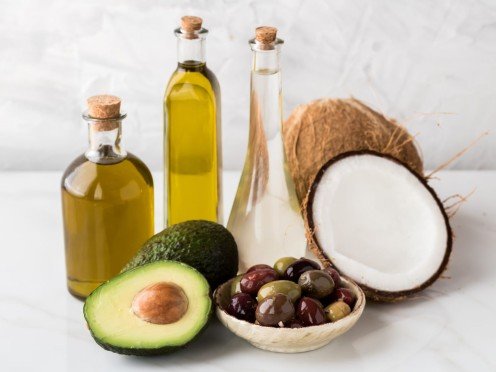
Healthy Cooking Oils: A Guide to Better Kitchen
Cooking oils are more than just flavor enhancers; they’re essential players in crafting the taste and texture of our meals. But there’s more to them than meets the eye—they have a profound impact on our health. From heart health to inflammation control, the cooking oils we choose shape our well-being. In this guide, we explore the world of cooking oils, distinguishing the healthy from the unhealthy, and shedding light on their pivotal role in our kitchen and health routine.

Here are five types of healthy cooking oils that should be prioritized for their nutritional benefits:
- Extra Virgin Olive Oil: Renowned for its rich flavor and robust health benefits, extra virgin olive oil is a staple in Mediterranean cuisine. Monounsaturated fats, especially oleic acid, abound in it, and studies connect it to less inflammation and better heart health Additionally, it contains potent antioxidants, such as polyphenols, which exhibit anti-inflammatory and antimicrobial properties. Extra virgin olive oil works best for cooking at low to medium temperatures, making salad dressings, and drizzling over finished dishes.
- Avocado Oil: Extracted from the pulp of ripe avocados, avocado oil is prized for its high smoke point and mild, buttery flavor. Rich in monounsaturated fats and oleic acid, it promotes cardiovascular health and may help lower LDL cholesterol levels. Avocado oil also boasts an array of vitamins and minerals, including vitamin E and potassium, which contribute to its antioxidant and anti-inflammatory properties. Its high smoke point makes it ideal for high-temperature cooking methods like frying and grilling.
- Coconut Oil: Celebrated for its unique flavor and versatile culinary applications, comes from the meat of mature coconuts. Coconut oil consists mainly of medium-chain triglycerides (MCTs), which the body rapidly metabolizes into energy. Despite its high saturated fat content, coconut oil has shown to raise levels of HDL (good) cholesterol and improve overall cholesterol ratios. It is suitable for baking, sautéing, and light frying, thanks to its stable nature at high temperatures.
- Flaxseed Oil: Extracted from flaxseeds, flaxseed oil is renowned for its high concentration of omega-3 fatty acids, particularly alpha-linolenic acid (ALA). Omega-3 fatty acids are essential for brain health, cardiovascular function, and inflammation regulation. Flaxseed oil also contains lignans, plant compounds with antioxidant and estrogenic properties, which may confer additional health benefits. Flaxseed oil’s delicate nature and susceptibility to oxidation make it best suited for use as a finishing oil or addition to salad dressings and smoothies
- Grapeseed Oil: Derived from the seeds of grapes, is prized for its neutral flavor and high smoke point, which makes it suitable for a variety of cooking methods. It is rich in polyunsaturated fats, particularly omega-6 fatty acids, which contribute to heart health and inflammatory balance when consumed in moderation. Grapeseed oil also contains vitamin E, a potent antioxidant that helps protect cells from oxidative damage. Its versatility makes it an excellent choice for frying, roasting, and baking.
The Role of Cooking Oil in Our Health:
Cooking oil isn’t just for cooking—it’s a nutritional powerhouse that influences how our bodies absorb essential vitamins. Fat-soluble vitamins like A, D, E, and K require fats for proper absorption, and cooking oils fulfill this need. Plus, the type of oil we use can affect our cholesterol levels, inflammation, and overall heart health.
How Much Cooking Oil is Necessary in Our Kitchen:
Moderation is key when it comes to cooking oil. The amount you need depends on your cooking methods, portion sizes, and dietary goals. Use just enough to get the job done—it’s not only healthier but also helps manage your calorie intake for weight control.
Importance of Choosing Healthy Oils:
Choosing the right oil isn’t just about taste; it’s a health decision. Healthy oils, rich in monounsaturated and polyunsaturated fats, offer a host of benefits like improved heart health and reduced inflammation. By making these oils a staple in your diet, you’re taking a proactive step toward a healthier lifestyle.
Unhealthy Oils and Their Impact on Health:
Not all oils are created equal—some can spell trouble for your health. Oils high in saturated and trans fats have been linked to heart disease, inflammation, and metabolic issues. Steering clear of these oils can safeguard your health and well-being.
Considerations When Choosing Healthy Oils:
With so many options on the market, it’s essential to consider factors like smoke point & fatty acid composition when selecting cooking oils. Look for oils with higher smoke points for high-temperature cooking, and prioritize those packed with heart-healthy fats like omega-3s and omega-6s.
How to Store Cooking Oil:
Proper storage is vital to preserve the quality of your cooking oils. Store them in a cool, dark place away from heat and sunlight, and ensure that you tightly seal the containers to prevent oxidation Refrigerating certain oils can further extend their shelf life.
Should We Cycle Our Oil:
While it may seem like a good idea to switch up your oils regularly, it’s not always necessary. Some oils, like olive oil and coconut oil, can withstand repeated use without issue. However, oils prone to oxidation may benefit from occasional cycling. Regardless, keep an eye on oil quality and discard any rancid oils promptly.
Diseases Caused Due to Cooking Oil:
Consuming unhealthy cooking oils can contribute to a range of diseases, from heart issues to metabolic disorders. Monounsaturated fats, especially oleic acid, abound in it. Studies connect it to less inflammation and better heart health. Opting for healthier oils can help mitigate these risks and promote long-term health.
Also Read: Unveiling The Healing Potential Of Hemp Oil: From Extraction To Medical Applications








